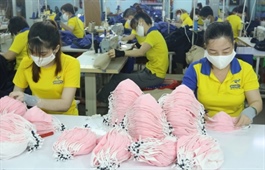Online ad regulations tightened up
Online ad regulations tightened up
The Vietnamese government is stepping up efforts to tighten legal oversight of advertising by celebrities and key opinion leaders amid mounting concerns over misinformation and consumer protection.
The Ministry of Culture, Sports, and Tourism is undertaking a review of the Law on Advertising. Proposed amendments are expected to introduce clearer rules governing advertising on social platforms, with specific provisions targeting the responsibilities and conduct of influencers and public figures.

Influencers are being urged to provide accurate information and take responsibility for misleading claims, photo KeRa |
One of the most significant shifts proposed in the draft amendments is the transition from a pre-check to a post-check regulatory model. Under the new framework, instead of requiring prior approval and content censorship, the law will establish clear definitions of rights and responsibilities for all parties involved in advertising activities.
Violations will be subject to a comprehensive range of enforcement measures, including administrative sanctions, disciplinary actions, criminal prosecution, or civil liability.
For the first time, the draft sets out specific obligations for individuals who transmit advertising content. This includes key opinion leaders (KOLs) and internet celebrities.
The draft amendments were presented to the National Assembly during its eighth session and is scheduled to be submitted for approval at the ninth session in May
“As the digital economy rapidly evolves, advertising activities, particularly those involving artists and influencers on social media, are becoming increasingly sophisticated. Recent violations underscore the need for greater oversight,” said Le Hai Binh, Permanent Deputy Minister of Culture, Sports, and Tourism, on April 6.
The legal overhaul follows a high-profile case involving the promotion of counterfeit health supplements. On April 3, the Ministry of Public Security launched a criminal investigation into fraudulent sales conducted by Asia Life JSC and Chi Em Rot Group JSC, which saw popular influencers Nguyen Thi Thai Hang and Pham Quang Linh detained for endorsing the products without conducting proper verification.
The case, which was unfolded between last December and March this year, saw more than 135,000 units of Kera SuperGreens Gummies sold to over 30,000 consumers, generating an estimated $685,000 in revenue. In response, the Authority of Broadcasting and Electronic Information imposed administrative fines of $2,800 on each influencer on March 20 and required them to issue public corrections, further reinforcing calls for stricter oversight and greater accountability in digital advertising.
The incident has reignited public concern regarding influencer responsibility and raised questions about the adequacy of current laws.
Nguyen Quynh Anh, vice chairwoman of the National Competition Commission under the Ministry of Industry and Trade, has advocated for a robust licensing and regulatory framework for KOLs and celebrities engaged in advertising. “Licensing is not simply about enforcement, it is a necessary tool to ensure the quality of advertising content and to hold public figures accountable for the information they disseminate,” Anh said on April 4.
She added that the commission would work closely with relevant agencies and industry associations to improve transparency and safeguard consumer interests.
“Businesses and individuals must publicly declare any commercial arrangements with KOLs. At the same time, KOLs must provide accurate, verifiable information and take full responsibility for any misleading claims. Sponsored content must be clearly disclosed to consumers,” Anh noted.
Communications expert Ha Hong Viet also warned that misleading advertisements could not only cause financial harm to consumers but also damage the credibility of legitimate brands and ethical businesses.
“When influencers fail to verify the quality of products they promote, they risk becoming conduits for misinformation,” Viet told VIR. “This erosion of consumer trust affects the entire market ecosystem.”
Vietnam’s ongoing regulatory efforts in the livestreaming sector are part of a broader regional shift towards tighter oversight, with China providing one of the most developed examples of a comprehensive legal framework for this fast-evolving space.
According to a Statista update in March, the country’s livestreaming audience reached 833 million in 2024, with the sector evolving into a multi-billion-dollar industry. Livestreamers generate significant income through advertising, endorsements, and viewer contributions such as tips and virtual gifts.
What began as a novel form of content has evolved into a full-fledged commercial ecosystem. In 2023 alone, livestreaming e-commerce accounted for nearly $690 billion in gross merchandise value, representing the highest level of market penetration across digital retail formats.
Faced with this explosive growth, Chinese regulators moved quickly to implement a stringent framework aimed at consumer protection and ethical conduct. Key measures include mandatory real-name registration, licensing requirements for livestreamers, and strict disclosure rules regarding product origin, pricing, features, and warranties.
Moreover, Chinese authorities prohibit the use of absolute claims such as “the best” or “the cheapest” in livestream promotions. Misleading tactics, including inflating viewership numbers or faking consumer engagement, are considered fraudulent.
Additionally, to protect younger users, China mandates identity verification for both livestream viewers and gifters, while placing content restrictions to prevent inappropriate exposure. In specialised sectors such as healthcare, finance, and education, livestreamers must possess verified professional qualifications before promoting related products or services.
|
Le Hai Binh, permanent Deputy Minister of Culture, Sports, and Tourism The participation of celebrities, singers, and artists in advertising is a common phenomenon, but with the development of social media, it is becoming an increasingly popular trend. We have the Advertising Law to regulate these advertising activities. With the increasing presence of advertisements on social media, relevant ministries have taken various measures to inspect, supervise, and address the existing limitations. In 2021, the Minister of Information and Communications promulgated the code of conduct on social networks. Later the same year, the ministry also issued a code of conduct for Vietnamese artists on social media to guide civilised behaviour and responsibility on digital platforms. Given the constant changes in reality, the ministry is coordinating with relevant agencies to amend and supplement the Law on Advertising 2012. We have received numerous opinions and contributions to enhance the legal framework. In the upcoming revision, the Advertising Law is expected to include more specific provisions regarding the responsibility of celebrities when participating in advertising. Organisations and individuals engaged in advertising activities will not only be held accountable under the law but also have the obligation to verify the accuracy and transparency of the products before disclosing information to the public. The draft decree guiding the implementation of the Advertising Law is also proposing specific provisions to regulate the behaviour of artists and key opinion leaders when conducting advertising on social media. The ministry is considering implementing stricter sanctions for violations, including prohibiting participation in advertising, restricting artistic activities, or limiting appearances on mainstream media and social media platforms. Celebrities who violate the Advertising Law may face restrictions on their artistic activities and appearances on media outlets and social media platforms. Vo Van Chung, vice president Vietnam Consumer Protection Association The emergence of e-commerce has opened up a vast and highly efficient space for the involvement of government agencies, organisations, and society at large. However, alongside these opportunities, violations of consumer rights within the e-commerce environment have also grown rapidly, becoming more diverse and increasingly prevalent. In response, the Vietnam Consumer Protection Association and its provincial and municipal affiliates have intensified awareness campaigns, providing consumers with information about the individuals and organisations conducting business on e-commerce platforms. These initiatives are aimed at raising consumer awareness and encouraging greater vigilance when shopping online. At present, the greatest challenge for regulators lies in effectively receiving and responding to consumer feedback regarding their difficulties and negative experiences, in order to address at least some of the issues encountered in e-commerce transactions. Furthermore, violations in Vietnam are not limited to the sale of poor-quality goods or breaches of intellectual property rights. More serious issues such as fraud and misappropriation of assets on digital platforms are also on the rise. The complexity of digital business models in Vietnam makes it particularly difficult to identify and address such infringements. This challenge is even more pronounced in the context of cross-border e-commerce, where not all consumers possess the necessary tools or knowledge to request businesses to negotiate or resolve disputes through online channels. |
- 09:57 18/04/2025



























